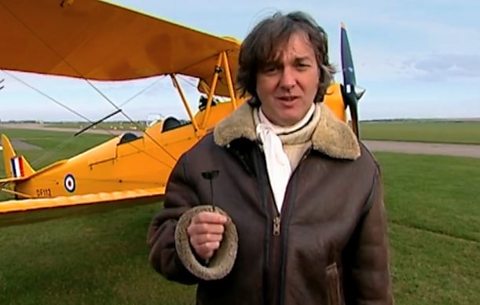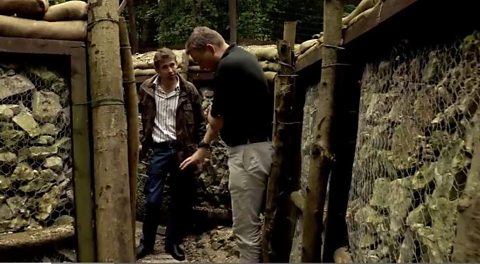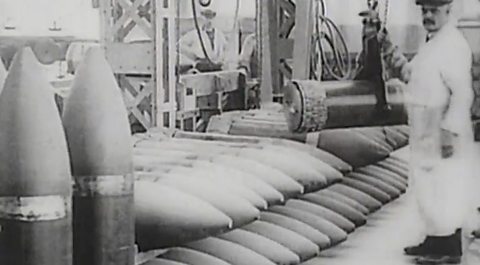DAN SNOW:Hello, I'm Dan Snow. World War One was the first major conflict where planes played a key role in the fighting.
DAN SNOW:Not just to be used in reconnaissance missions, but dropping explosives and taking part in real airborne battles. The importance of planes in the Great War lead to the creation of the RAF, in 1918.
DAN SNOW:One thing that demonstrated the need for them and the fighter pilots who flew them, was the way they met the threat of the machines that had previouslydominated the skies.
DAN SNOW:These were Germany's dreaded Zeppelins. The airships, that if unchallenged, would rain terror onto the British people and put genuine fear in their hearts.
DAN SNOW:Here's Ben Robinson, looking at how the balance of air power shifted forever.
BEN ROBINSON:'At the beginning of September 1916, 'more than a dozen German airships headed for Britain. 'Their largest raid ever.
BEN ROBINSON:'Bombs fell in Nottinghamshire, Lincolnshire and Kent, 'but only one airship made it through to the primary target - London.
BEN ROBINSON:'When the SL11 appeared over the capital, 'it immediately came under heavy anti-aircraft fire. 'From Alexandra Palace, 'you'd have been able to witness the entire spectacle.'
HISTORIAN:'They'd never heard so much noise, it's 2 o'clock in the morning,' but people are getting out of their beds because they think this is different. And they come out, and they can see this airship in the sky, 'caught in the searchlights.
HISTORIAN:'And then as this zeppelin moves across the sky, 'suddenly there's an aeroplane in pursuit. 'He makes one pass from the front to the rear end, 'nothing happens.' He makes a second pass along the side, still nothing happens.
HISTORIAN:He's got one drum of ammunition left and he's despairing that it's not going to work. But then he takes up a position below the rear of the airship, and fires his whole drum of ammunition into one spot. And then suddenly, he sees it go pink and red, and that's it.
HISTORIAN:It's all over for the zeppelin. The zeppelin catches fire. The hydrogen is burning, there's no way back for the zeppelin then. 'And eventually, when it finally crashes to the ground, 'it's like a huge, burning candle that is going down, 'and then people start cheering.
HISTORIAN:'They're cheering and cheering like they've never cheered before.' Trains start blowing their hooters. Factory's whistles start going off. One policeman says he was unnerved by the cheers because they were just such, cold, merciless cheers. People hated that airship and they wanted to see it come down.
BEN ROBINSON:'The airship eventually crashed in rural Hertfordshire, 'about 15 miles away. 'And Britain at last had a hero. '19 year-old, Leefe Robinson, the pilot who shot down SL11, was awarded the Victoria Cross and became an instant celebrity.'
HISTORIAN:'Next day becomes known in the press as Zepp Sunday. 'Tens of thousands of people make a pilgrimage out from London 'out to the tiny, little village of Cuffley, 'and literally The Times recorded it as the greatest free show London has ever seen.
HISTORIAN:'People are going there to see the wreckage of this zeppelin, 'to try and get a souvenir. 'And more and more people are coming out for the next few days as well. 'It's just a mass exodus from the city to go and see the end 'of this fearful raider. The baby-killer is no more.'
BEN ROBINSON:'The authorities decided to bury the crew of the airship 'with full military honours. 'That further enraged public feeling. 'One woman hurled eggs at the coffins for which she was fined 5 shillings.'
BEN ROBINSON:While Britain cheered Leefe Robinson, the German response was to go big. The so-called 'Super Zeppelins'. But while the raids continued, we'd now found their Achilles' heel,and the zeppelin's days were numbered.
BEN ROBINSON:'Explosive and incendiary bullets, 'which could set the hydrogen in the zeppelins alight, 'proved their undoing. 'Barely two weeks later, 'one of these new super zeppelins was brought down 'in the village of Little Wigborough, south of Colchester, in Essex.'
INTERVIEWEE:It's back was broken in… Whilst the nose and other part was perfect. But all the canvas got burnt, all of them just left the bit of the, piece of the relics you see? That's aluminium, that's for lightness.
BEN ROBINSON:'The crew all walked away unharmed.'
INTERVIEWEE:Yeah they passed the gate here, 21 of them all walked past, and that was a big relief when they did get past. There was a special constable met them up at the next village.
INTERVIEWEE:And he took them in hand, he got on his old push-bike, and he was going to try and take them to Mersey, to the military, but he took them to Peldon Post Office, and that's where they were handed over to the police.
BEN ROBINSON:'The crew of a second zeppelin weren't so lucky. 'They all died when it crashed in flames near Billericay, in Essex. 'Again, thousands of people turned out to look at the wreckage, 'including Leefe Robinson and the Secretary of State for War, 'Lloyd-George.
BEN ROBINSON:'By the end of the month, 'Germany's leading zeppelin captain, Heinrich Mathy, had also been killed, 'and four German airships had been reduced to scrap.
BEN ROBINSON:'It was the beginning of the end for the baby-killers.' There were further zeppelin raids, but now people were much more likely to see zeppelins, not in the skies, but as these fragments. Bits of shot down zeppelin.
BEN ROBINSON:There was a lively trade in these, and some money was raised for injured soldiers. But the zeppelin menace, the threat that they represented, had been transformed into mere curios and trinkets.
BEN ROBINSON:'During their brief but deadly dominance, 'the Zeppelin airships had killed more than 500 people, 'and injured more than a thousand in places all across the country.'
BEN ROBINSON:But the last ever attempt to bomb Britain by a zeppelin was here, over the Norfolk coast, and it's fitting that this is where the aerial war ended.
BEN ROBINSON:'On 5th August 1918, aircraft of the newly formed Royal Air Force 'scrambled from Great Yarmouth, 'as five zeppelins approached the Norfolk coast. 'Soon afterwards, one of the airshipsplunged seawards in a blazing mass.'
BEN ROBINSON:Just three years before, when a zeppelin first appeared here in the skies above Great Yarmouth, it was an invincible force. There was nothing we could do to stop these machines. But now they were hopelessly out-classed and never again would an airship rule the skies.
BEN ROBINSON:'But the zeppelin war had shown us that those at home 'could be as vulnerable as those on the front line. 'War had been brought to the front door and something had to change.'
BEN ROBINSON:The air raids made the government acutely aware that they needed an aerial defence system that operated in depth.
BEN ROBINSON:They led to the formation of the RAF in 1918, and to the development of operations rooms, such as this one here at Ducksford, that proved so crucial in 1940, during the Battle of Britain. And ultimately, victory in the second World War.
Video summary
Ben Robinson looks at how German Zeppelins caused terror in World War One by bombing British towns and cities.
Aeroplanes were used to counter the threat from these airships to set fire to the hydrogen and shoot them down.
New developments that could penetrate the Zeppelin canopy and set fire to them reduced the threat from these airships.
In total, over 500 people in Britain were killed by Zeppelin raids and over 1000 more were injured.
By 1918 the newly formed Royal Airforce was able to counter the Zeppelin threat.
Teacher Notes
Key Stage 3:
Could be used as part of a study about the 91»»±¨ Front.
Students could watch the clip and then write a newspaper report about a bombing raid, using it as propaganda to encourage people to join the army to counter the German threat.
This could then be linked to propaganda posters about recruitment and the role of the RAF on the front line as well as in Britain.
Key Stage 4 / GCSE / Higher Levels:
Could be used in a lesson about new technology and weapons in the First World War.
Students could watch the first part of the clip about Zeppelins and then be asked to work in groups to come up with a plan to counter the Zeppelin threat and compare their ideas to the Royal Airforce solutions.
They could then compare the threat from Zeppelins to other new technology (machine guns, artillery, gas) to evaluate which was more of a threat.
This clip will be relevant for teaching History at KS3 and KS4/GCSE in England Wales and Northern Ireland.
Also at 3rd Level, 4th Level, National 4/National 5 and Higher in Scotland.
How challenging was the life of a pilot in World War One? video
James May looks at the dangers and challenges facing pilots in World War One.

What were trench conditions like in World War One? video
Saul David looks at how British soldiers coped with trench conditions in World War One

How did Britain meet demands for weapon production in World War One? video
Saul David on how Britain struggled to produce the weapons to supply the army in World War One.
